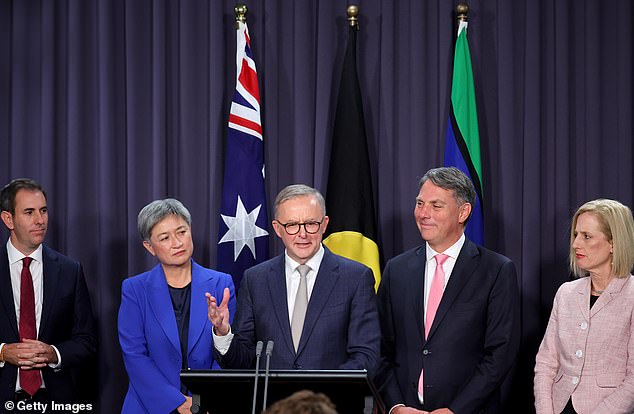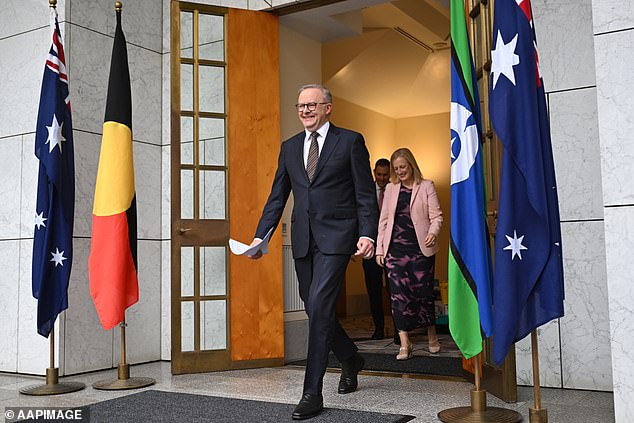Peter Dutton makes massive call on Aboriginal flag after Anthony Albanese’s bold change after being elected Prime Minister
Peter Dutton has declared he will stand alone in front of the Australian flag if elected Prime Minister. He claims that having three flags “unnecessarily divides our country.”
Since Anthony Albanese became Prime Minister, the Australian flag has been seen alongside Aboriginal and Torres Strait Islander flags at press conferences.
Before he was elected, only the Australian flag was displayed.
But Mr Dutton called out the move, saying he would only address the country with the Australian flag behind him.
“I strongly believe that we were a country united under one flag,” Dutton told Peta Credlin on Monday evening.
‘We ask people to identify themselves with different flags, no other country does that, and we are dividing our country unnecessarily.
“We must respect the Indigenous and Torres Strait Islander flags, but they are not our national flags.”
Mr Dutton also slammed Mr Albanese for sending “a very confusing message” to Australians about the country’s values and celebrating Australia Day.
Opposition Leader Peter Dutton said he would stand alone in front of the Australian flag when addressing the country if elected prime minister.

Since Anthony Albanese became Prime Minister, the Australian flag has been seen alongside Aboriginal and Torres Strait Islander flags at press conferences
He branded Albanese “the weakest prime minister” in the country’s history and claimed Australians should celebrate the national holiday under “one flag”.
“The Prime Minister is not calling out Woolworths or the pubs that don’t want to celebrate Australia,” Dutton said.
“He wants to be all things to all people, and that is why people rightly regard him as the weakest prime minister we have had in the history of our country.
‘I think it’s a fact that we have to stand up for who we are, for our values, what we believe in.
“We are united as a country when we come together under one flag, and that is what we should do on Australia Day.”
Mr Dutton said Australians should instead think more about the country’s rich migrant story and “appreciate and respect” its history of migration.
“The incredible story of people who came here, especially in the post-World War II period, with nothing, and worked hard as a profession, as farmers, and raised their children,” Dutton said.
‘The next generation has done incredibly well. They have done well themselves. That’s why we are a great country today. We don’t talk about that part of our history and so that’s a position I’ve taken.”
A surprising new poll shows Dutton is on course for a victory in the upcoming federal election.
A seat-by-seat analysis of the latest polls shows that the Albanian government currently has an ‘almost zero’ chance of retaining its majority in the House of Representatives, while the coalition will take away at least nine seats in next year’s federal elections.

Dutton branded Anthony Albanese the ‘weakest’ Prime Minister and claimed he was sending a ‘very confusing message’ to Australians about the country’s values
The shock forecast comes after almost 5,000 voters were surveyed by Accent Research and the RedBridge Group, who then modeled what the composition of the federal parliament is likely to look like after the next election.
RedBridge found that the Coalition’s strategy of targeting the outer suburbs and provincial seats hit hard by the cost of living crisis won over voters.
Based on current voting intentions, there is an 82 percent probability that the Coalition would have the most seats in the lower house, winning between 64 and 78 seats, compared to 59 to 71 for Labour, according to Accent Research director Dr Shaun Ratcliff.
The Greens and crossbenchers were likely to win thirteen seats, with fourteen other voters too close to call.
Parties must win 76 seats in the House of Commons to form a government.
